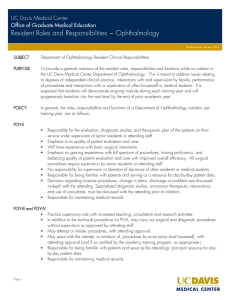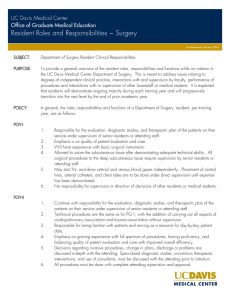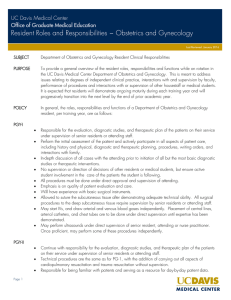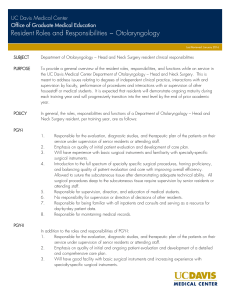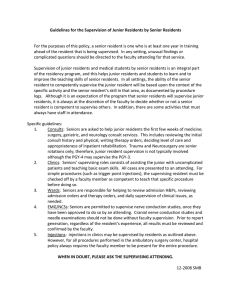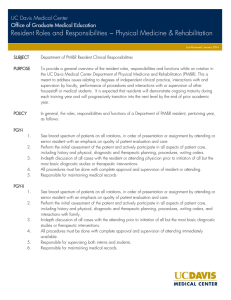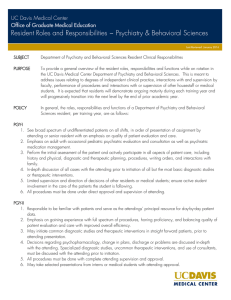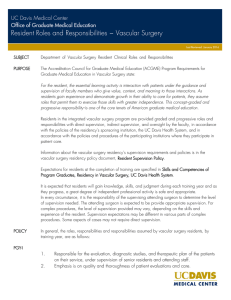Resident Roles and Responsibilities ~ Urology UC Davis Medical Center
advertisement
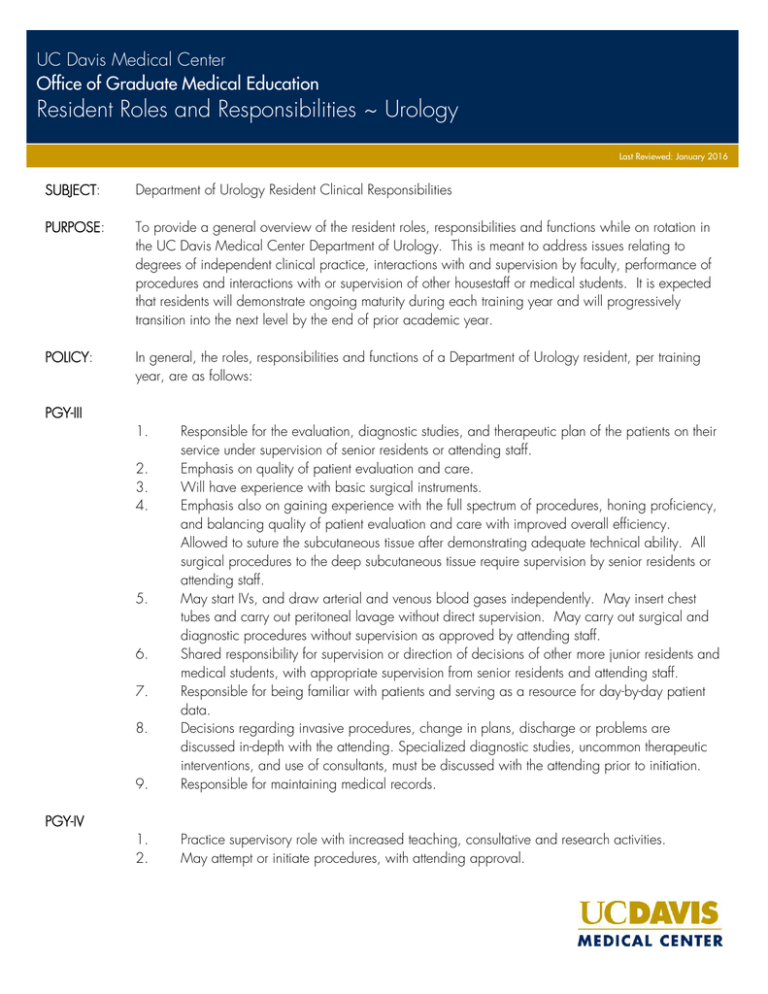
UC Davis Medical Center Office of Graduate Medical Education Resident Roles and Responsibilities ~ Urology Last Reviewed: January 2016 SUBJECT: Department of Urology Resident Clinical Responsibilities PURPOSE: To provide a general overview of the resident roles, responsibilities and functions while on rotation in the UC Davis Medical Center Department of Urology. This is meant to address issues relating to degrees of independent clinical practice, interactions with and supervision by faculty, performance of procedures and interactions with or supervision of other housestaff or medical students. It is expected that residents will demonstrate ongoing maturity during each training year and will progressively transition into the next level by the end of prior academic year. POLICY: In general, the roles, responsibilities and functions of a Department of Urology resident, per training year, are as follows: PGY-III 1. 9. Responsible for the evaluation, diagnostic studies, and therapeutic plan of the patients on their service under supervision of senior residents or attending staff. Emphasis on quality of patient evaluation and care. Will have experience with basic surgical instruments. Emphasis also on gaining experience with the full spectrum of procedures, honing proficiency, and balancing quality of patient evaluation and care with improved overall efficiency. Allowed to suture the subcutaneous tissue after demonstrating adequate technical ability. All surgical procedures to the deep subcutaneous tissue require supervision by senior residents or attending staff. May start IVs, and draw arterial and venous blood gases independently. May insert chest tubes and carry out peritoneal lavage without direct supervision. May carry out surgical and diagnostic procedures without supervision as approved by attending staff. Shared responsibility for supervision or direction of decisions of other more junior residents and medical students, with appropriate supervision from senior residents and attending staff. Responsible for being familiar with patients and serving as a resource for day-by-day patient data. Decisions regarding invasive procedures, change in plans, discharge or problems are discussed in-depth with the attending. Specialized diagnostic studies, uncommon therapeutic interventions, and use of consultants, must be discussed with the attending prior to initiation. Responsible for maintaining medical records. 1. 2. Practice supervisory role with increased teaching, consultative and research activities. May attempt or initiate procedures, with attending approval. 2. 3. 4. 5. 6. 7. 8. PGY-IV UC Davis Medical Center Office of Graduate Medical Education Resident Roles and Responsibilities ~ Urology Last Reviewed: January 2016 3. 4. 5. 6. May assist with the attempt, or initiation of, procedures by more junior level housestaff, with attending approval (and if so certified by the residency training program, as appropriate.) Responsible for being familiar with patients and serve as the attendings’ principal resource for day-by-day patient data. Responsible for running “board rounds” at change of shift and for providing a teaching discussion presentation at morning board rounds. Responsible for maintaining medical records. PGY-V 1. 2. 3. May carry out major nonlife-threatening surgical procedures and may carry out all diagnostic procedures without direct supervision. Responsible for supervising junior residents. Responsible for maintaining medical records. PGY-VI 1. 2. 3. May carry out major surgical procedures and all diagnostic procedures previously unlisted without direct supervision. Responsible for supervising junior residents. Responsible for maintaining medical records. Fellows Fellows generally are trainees who have completed their initial residency training. They are expected to continue to gain knowledge, procedural skills, and judgment in their chosen field of specialty study, building on their initial residency base and working both with inpatients and outpatients. Fellows will learn indications and complications of specialty procedures, appropriate use of diagnostic studies in their area, and proper use of medications. Progressive development of solid clinical judgment will be expected. They are supervised by attending physicians and may supervise residents.
